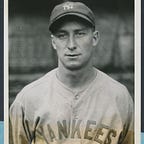Thursday, May 5, 1927: Washington D.C.
“Out of the Coal Mine.”
 I woke up today a Yankee. A Yankee once again.
I woke up today a Yankee. A Yankee once again.
Dutch Ruether is having a helluva start to the season: 3–0 with an ERA of 1.59. “I’m 33 but I’m feelin’ 27,” he boasted to Benny and me in the locker room before yesterday’s game against the Senators. “My pitches have Zip! Zip!! Zip!!! on ’em. It feels like 1922.”
Back in ’22, while pitching mostly fastballs, Ruether won 21 games for the less than mediocre Brooklyn Robins, a team that had only 76 victories in all.
Ruether also had a terrific year in 1919, when he won 19 games, lost just six, had an ERA under two, and pitched the Reds into the World Series against the Black Sox. Dutch will provide anyone who asks about that infamous series with a pitch-by-pitch dissertation about how his 9–1 win in the opening game was actually on the up and up.
“I’ll swear it on a bible!” he’ll shout. It’s enough to make anyone within earshot an atheist.
Yesterday, though, Dutch wasn’t swearing on a bible — he was swearing on the mound.
 Ruether strode onto the hill for the bottom half of the first inning with a 3–0 lead, thanks to a leadoff triple by Combs, a single by Koenig and a two-run homer by Gehrig. Once on the mound, with great confidence, he reared back and fired a fastball that had a good amount of speed but not much of his bragged about Zip! Zip!! Zip!!! Instead, his very first pitch of the game was met at the plate by the Senators’ Stuffy Stewart’s bat — whereupon the ball immediately picked up a great deal of Zip!
Ruether strode onto the hill for the bottom half of the first inning with a 3–0 lead, thanks to a leadoff triple by Combs, a single by Koenig and a two-run homer by Gehrig. Once on the mound, with great confidence, he reared back and fired a fastball that had a good amount of speed but not much of his bragged about Zip! Zip!! Zip!!! Instead, his very first pitch of the game was met at the plate by the Senators’ Stuffy Stewart’s bat — whereupon the ball immediately picked up a great deal of Zip!
The ball landed deep in the left field corner of the outfield. Zip!!
Then bounced off the wall. Zip!!!
Then began rolling back toward home plate, like it was a yo-yo on a string.
Playing the sun field in left, Meusel loped after the ball in a manner that announced to one and all, “Let’s be honest about this. We all know that by the time I get to this ball it’s going to be a triple, whether I run after it or jog, so why rush things?” As always, Meusel technically was correct, but his lack of apparent effort is exactly the sort of thing that gets under the skin of everyone: the other players, Huggins, and most of all the New York press, who have scornfully dubbed him “Languid Bob” for his logical but lackadaisical play.
After Stuffy’s triple, Ruether tried to bear down, but was promptly lit up by the Senators. It was like Coney Island on the Fourth of July: back-to-back singles, followed by a walk, then a double and then two more singles. Since it was a Wednesday game, there were only 3,000 people in the stands, so the crack of the bat against the ball with each hit sounded like a firecracker. Thwack! Thwack! Thwack! Thwack! Thwack!
Dutch’s final line for his all too brief appearance: Eight batters. Six base hits. One walk. And six earned runs. Not a good day at the office.
As Dutch walked off the mound to be relieved by Sailor Bob Shawkey, Benny leaned over to me and whispered, “Pretty sure tonight Dutch will be looking for his fucking Zip! Zip!! Zip!!! at the bottom of a bottle of hooch, hooch, hooch.”
With men on, Shawkey, who Miller Huggins had called in to put out the fire, immediately proceeded to douse it with gasoline, giving up a two-run triple to the first Washingtonian he faced, followed by two more singles. Having cleared the bases of Ruether’s detritus — before starting a merry-go-round of his own — Sailor Bob eventually managed to crawl out of the inning.
We were now down 7 to 3. After one inning of play.
“Thomas!” I heard Huggins shout. “Warm up.”
Finally.
 I came to spring training this year with no assurances, but feeling confident that I would make the team again and contend for a spot in Huggins’ rotation — maybe not as a regular starter, but as an important part of the pitching staff. But things never quite fell together in St. Petersburg. Wilcy Moore, a 29-year-old rookie, sidearm sinker ball thrower, who was on the verge of giving up baseball for good and heading back to his father’s cotton farm, had a very good showing in camp. Now the cotton farmer has Huggins’s confidence, and I have a seat on the bench.
I came to spring training this year with no assurances, but feeling confident that I would make the team again and contend for a spot in Huggins’ rotation — maybe not as a regular starter, but as an important part of the pitching staff. But things never quite fell together in St. Petersburg. Wilcy Moore, a 29-year-old rookie, sidearm sinker ball thrower, who was on the verge of giving up baseball for good and heading back to his father’s cotton farm, had a very good showing in camp. Now the cotton farmer has Huggins’s confidence, and I have a seat on the bench.
Being buried on the bench, especially on a team like the Yankees with so many good pitchers ahead of me — bolstered by so many great hitters to bail them out of any bad performance — being on this Yankee bench is like being trapped deep in a coal mine. It’s a suffocating experience, filled with darkness and the fear that you might never again see the light of day.
But now, thanks to the miserable pitching of Ruether and Shawkey, I’m at least temporarily back on the surface. As I wait to face my first batter of the year, it feels like I’ve climbed out of a mine shaft that opens directly onto the Griffith Stadium pitcher’s mound.
The air is different standing on top of the hill with Ruth, Gehrig, Meusel, Combs, Lazzeri and Dugan behind you. Everything seems bright. Everything seems clear.
The first batter I face is Sam West, a well-built 22-year-old rookie who’s come into the game as a replacement for the Senators’ right fielder, Nick Cullop. I’ve never faced West before, but I’ve watched him batting in our earlier games. Twice he’s hit the ball well against Hoyt, slashing an RBI single and stroking an RBI double. Hoyt, though, can get careless with rookies sometimes, looking past them to the next batter. I can’t look past any hitter if I want to stay out of the coal mine.
In college and the early minors I could just throw the ball past hitters, but the major leagues are different. Up here I’m no Walter Johnson. I’m not blowing the ball by any of the quality hitters. Up here my goal isn’t to put a batter back on his heels, it’s to keep him on his toes — off balance.
Last year I pitched a little over a dozen innings against the Senators, so I can be sure West’s teammates have told him not to be scared of my fastball — and to be ready for my forkball. He’ll be looking for it. Or trying to.
But he’s a rookie and not a patient hitter. He knows it, and so do I. My guess is he’s thinking that I’m going to waste a pitch or two against him, knowing he’s an overeager rookie hitter. So I decide to cross him up, and throw him strikes from the get-go.
I start him off with a fastball, which he takes. Strike one.
My next pitch is a curve, low and away. West doesn’t bite, so now we’re 1-and-1.
Johnny Grabowski, our best defensive catcher, calls for another pitch low and away. I deliver a slow, sinking curve that nips the outside corner of the plate.
West is behind, but I haven’t thrown him anything to make him think he can’t hit me. He’s so anxious that he doesn’t even step out of the box between pitches. He’s expecting more outside junk. He’s up on his toes, right where I want him.
I jam him inside with a fastball that he pops up. Johnny tosses his mask as far as he can and waits for the ball to come down to him.
One out.
The air on the mound is still fresh and clear.
The next batter is Joe Judge, an undersized first baseman — he’s barely 5’8” — who defensively plays first with the quickness and sureness of a shortstop, and hits the ball like a third baseman. Now in his 12th year in the league, he won’t be as easy to fool.
I start Judge out with a fastball, which he takes. It paints the inside of the plate for a strike. Then Grabowski and I both agree that I should throw him a low and away curveball — but not completely waste the pitch. Judge agrees with our selection, and slaps the offering into left for a single.
I start to beat myself up for throwing the ball too close to the plate, but then quickly focus on the matter at hand: not letting Judge get a long lead off first while attending to the next batter, the Senators’ poor hitting shortstop, Topper Rigney.
Pitching from the stretch, I look over my left shoulder and see that Judge’s lead off first isn’t a large one. The odds of him trying to steal second with a four-run cushion are low, so I only glance over at him once before firing a fastball outside to Rigney, one of the few hitters I’m confident of throwing the ball past.
I’m right about Rigney who swings late and misses, but I’m wrong about Judge who gets a good break as he steals second. Or comes close. Grabowski has taken my fastball and turned it around quickly and with such force that the ball flies toward second at least as fast as I had hurled it toward home just a split second ago. Koenig runs over to cover the bag. He catches Grabowski’s rifle shot and puts a tag on Judge that looks like a shoe salesman placing loafers on a customer.
Two down.
Clean air.
Until I fool around with Rigney and walk him on a full count.
Nothing to be alarmed about, as Rigney’s followed by Bobby Reeves, a second-year player and talentless hitter. Fastball. Fastball. And a forkball that Reeves pounds into the grass for a Lazzeri-to-Gehrig inning-ending putout.
One hit. One base on balls. No runs. No runners advancing past first.
And so it goes for six more innings. I put my faith in Grabowski, who calls a great game. And I can feel him putting his faith in me.
On the mound I begin to feel a rhythm. I’m careful to share it only with Grabowski and hide it from the Senators, who although they touch me for six hits never threaten and only get two runners as far as second base.
We lose 7–4. The same score as when I arrived on the mound to start the second inning. After the game my biggest concern is muting my happiness. I don’t want to put my personal goals above the team’s.
But I’m out of the coal mine.
I’m back to being part of the team.
After dinner I’m exhausted. I haven’t pitched anything other than warmups in over two months — not a single trip to the mound since spring training. While Ruether is out at some gin joint busily searching for his Zip! Zip!! Zip!!! in multiple bottles of booze — without letting too much food get in the way — Benny and I take a walk around Washington, past the White House, over to the Washington Monument and then down to the Lincoln Memorial.
It’s a wonderful night with cool, crisp air, but I’m spent from the day.
I turn in early and fall asleep by 10:30.
- 1927 Yankees
- BENNY Bengough
- MILLER Huggins
- Walter Johnson
- Joe Judge
- Bobby Reeves
- Topper Rigney
- Dutch Ruether
- Stuffy Stewart
- Sam West
- 1919 World Series Game 1: Reds 9 vs. White Sox 1, Box Score
- May 4, 1927: “Yankees Subdued By Senators, 7–4”. New York Times article and Box Score.
